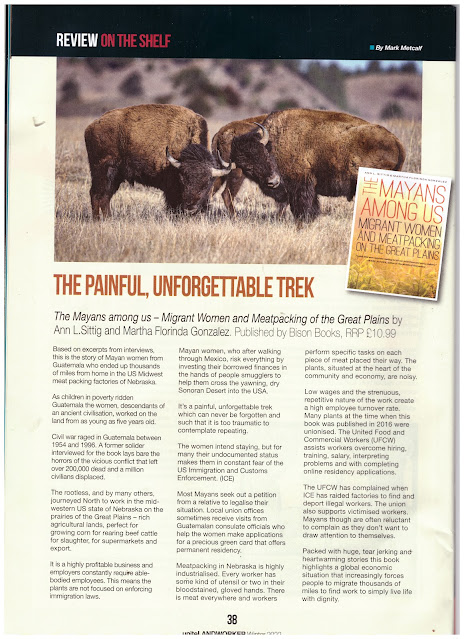THE PAINFUL, UNFORGETTABLE
TREK
THE MAYANS AMONG
US - Migrant Women and Meatpacking of the Great Plains
Ann L. Sittig
& Martha Florinda Gonzalez (who emigrated from Guatemala to Nebrasksa)
Published by Bison
Books, RRP £10.99
Based on excerpts
from interviews, this is the story of Mayan women from Guatemala who ended up thousands
of miles from home in the US Midwest meat packing factories of Nebraska.
As children in poverty
ridden Guatemala the women, descendants of an ancient civilisation, worked on the
land from as young as five years old. They received hardly any education as it
was assumed that as adults the women would look after their husbands and children.
Civil war raged in
Guatemala between 1954 and 1996. When President Jacobo Arbenz began
redistributing land to the poor the USA under President Eisenhower organised
Operation Success. Arbenz was replaced by US Army-trained Carlos Castillo
Armas. Guerilla activity began across Guatemala in 1960. In 1970, President
Carlos Arana Osario started assassinating his opponents and those suspected of sympathising
with the insurgents.
A former solider
interviewed for the book lays bare the horrors of the vicious conflict that left
over 200,000 dead and a million civilians displaced.
The rootless,
followed later by many others, journeyed North to work in the
midwestern U.S. state of Nebraska that encompasses the prairies of the Great
Plains. These rich
agricultural lands are perfect for growing corn on which beef cattle are reared
for slaughter with the meat then packed and transported to the major supermarket
chains and for export.
It is a highly
profitable business and employers such as Tyson, JBS, Swift, Cargill and Excel
constantly require able-bodied employees. This means the plants are not focused
on enforcing immigration laws.
Mayan women, who after
walking through Mexico, risk everything by investing their borrowed finances in
the hands of people smugglers to help them cross the yawning, dry Sonoran Desert
into the USA.
It’s a painful, unforgettable trek which can never be
forgotten and such that it is too painful to contemplate repeating.
On eventually reaching Nebraska the women, whose
intention is to find work and then send as much money home as possible, seek
support from an established Mayan community in which religious beliefs and
strong family ethics are key.
The women intend staying, but for many their
undocumented status does not allow for any future security or investments. A constant
fear exists of coming to the attention of the U.S. Immigration and Customs
Enforcement. (ICE)
Most Mayans seek out a petition from a relative to
legalise their situation. Local union offices sometimes receive visits from Guatemalan
consulate officials who help the women make applications for a precious green
card that offers permanent residency.
Meatpacking in Nebraska is highly industrialised. Every
worker has a designated spot and job to do and some kind of utensil or two in
their bloodstained, gloved hands. There is meat everywhere and workers perform
specific tasks on each piece of meat placed their way. The plants, situated at the
heart of the community and economy, are noisy.
Low wages and the strenuous, repetitive nature of the
work create a high employee turnover rate. Many plants at the time when this
book was published in 2016 were unionised. The United Food and Commercial
Workers (UFCW) assists workers overcome hiring, training, salary, interpreting problems
and with completing online residency applications.
The UFCW has complained when ICE has raided factories
to find and deport illegal workers. The union also supports victimised workers.
Mayans though are often reluctant to complain as they don’t want to draw
attention to themselves.
Packed with huge, tear jerking and heartwarming
stories this book highlights a global economic situation that increasingly
forces people to migrate thousands of miles to find work to simply live life
with dignity.

No comments:
Post a Comment